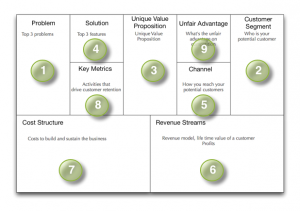It is a few months into 2014 and a few key trends are shaping the start-up and small business conversation. Lean business and growth hacking are at the core of today’s entrepreneurial universe. In an environment where funding is tight and hires are expensive, start-ups are finding creative ways to expand their talent pool, test and validate ideas to quickly bring the right products to market. One of the hottest trends is the growth of digital freelance talent and their use by top companies and start-up’s alike. Here’s a closer look at the top lean business trends for 2014, and what you need to know in order to implement them in your own company.
Use lean canvas methodology
The concept and use of lean canvasses can be transformative for both start-ups and established small businesses. A lean business isn’t just about outsourcing or fast product iterations. Lean methodology can and should be applied to every aspect of how you do business, embedded in the DNA of the way you build your company’s culture and processes. It’s about finding creative ways to serve your customers while minimizing waste and distractions along the way.
A lean approach can be used to break into a new business segment or validate a new product idea. Use lean critical thinking to validate concepts before you take them to market and scale them. Freelancers play an important role in creating a lean business, from writing test copy to offering analytics support on tests that you run. With the increasing quality of today’s freelance talent, it’s possible to get access to world class talent in every area from copywriting to financial modeling to interface design. Using freelancers allows you to stay on track with a lean approach, by minimizing the time spent on hiring, management, and other aspects of building a permanent team.
Extend your bench with the collaborative economy
 To effectively grow a digital business you may test and execute hundreds of different strategies and tactics. With the complexity of digital business increasing to include mobile, analytics, product development, social and so on, start-ups and small companies are limited by the collective knowledge of their core team, or are they? Traditionally it has not been feasible or desirable to make full-time hires for certain positions, when the returns on that hire remain an unknown. The strategy more companies are using today is partnering with expert consultants and hiring freelancers to assist on specific projects and efforts. By applying their expertise with a laser focus to your most urgent problems you can efficiently move your business forward in an agile fashion.
To effectively grow a digital business you may test and execute hundreds of different strategies and tactics. With the complexity of digital business increasing to include mobile, analytics, product development, social and so on, start-ups and small companies are limited by the collective knowledge of their core team, or are they? Traditionally it has not been feasible or desirable to make full-time hires for certain positions, when the returns on that hire remain an unknown. The strategy more companies are using today is partnering with expert consultants and hiring freelancers to assist on specific projects and efforts. By applying their expertise with a laser focus to your most urgent problems you can efficiently move your business forward in an agile fashion.
Fast Company recently reported 17 million freelancers are currently in the market but reports from Forbes have cited there are as many as 42 million U.S. based freelancers alone. This does not include the vast talent in Eastern Europe, South America and Asia etc. Key examples of how to use expert freelancers are to establish KPI dashboards and identify actionable insights from your analytics data. Companies that A/B test but are limited on design resources or want to test a wider rage of aesthetics and styles hire multiple freelance designers to work on the same creative. This type of crowdsourcing creates efficiencies and allows for dramatic innovations in the end result.
Freelancers can be leveraged for more than one off projects. Many companies are relying on a strategy of building long-term relationships with valuable freelancers and creating their own “agency of freelancers” to call on whenever specific expertise is required. The collaborative economy, or using the power of the Crowd in connection with freelancing, is allowing businesses to create flexible and fast-growing business models that tap into the most innovative ideas to solve a specific issue.
Success loves speed
 Marketing expert Dan Kennedy has frequently said “money loves speed.” The heart of the lean business is quickly putting out ideas and getting things into action. The approach leads to testing, faster iteration, and delivering more value in the shortest timeframe possible. As a result, businesses hit profitability more quickly while optimizing how they serve customers.
Marketing expert Dan Kennedy has frequently said “money loves speed.” The heart of the lean business is quickly putting out ideas and getting things into action. The approach leads to testing, faster iteration, and delivering more value in the shortest timeframe possible. As a result, businesses hit profitability more quickly while optimizing how they serve customers.
The strategic use of freelancers to fill critical roles within the lean organization can be the key to move the needle of your business faster! Digital skills are more important than ever. Highly-skilled, digitally-integrated freelancers often know a lot more about social and the web, compared to older full-time hires that aren’t as savvy. Hiring a freelance consultant is one of the most efficient ways to quickly access that expertise. Using a QA Testing platform like MyCrowd that allows you to quickly and easily vet, hire, and manage freelancers hires can really streamline the processes. In fact if you quickly hire and assign low level tasks to freelancers you can dramatically reduce the time your team is spending on non-critical issues. This means faster growth and higher profits.
How to get started with a lean business approach
Put these concepts to work in your own business by asking the following questions:
-
What are the bottlenecks in our company’s growth process that are caused by skills gaps or lack of time? For example, could another developer help you break through on a development project or could a freelance translator be the key to launching in a new market?
-
What positions would you hire for to give your current high performers extra leverage? Perhaps a freelance executive assistant could remove the administrative burden off your top performers so they can focus on their most urgent goals, or a ghostwriter could accelerate your founder’s thought leadership efforts in a whole new way.
-
What could we do in the next 12 months to deliver more value to our customers? Whether it’s graphic designers to enhance the customer experience or technical writers to create better support documentation, freelance workers can help you make small but critical investments in the customer experience for the year ahead.
Capitalizing on these trends has the potential to bring tremendous growth to digital businesses throughout 2014. The companies that come out ahead will be applying lean methodologies and growth hacking to their most critical problems. By applying these insights to general problem solving you can find better ways to move more quickly in the market. Accessing freelance talent is the lever that enables companies to achieve significant growth outcomes according to MyCrowd CEO, Matthew Cordasco, he says “Using freelancers was a key part to how we grew and sold our last company, Overstat, to IBM. That success is really the main reason we started MyCrowd” Let us know in the comments below how you’re putting lean methodologies to work for your business.



